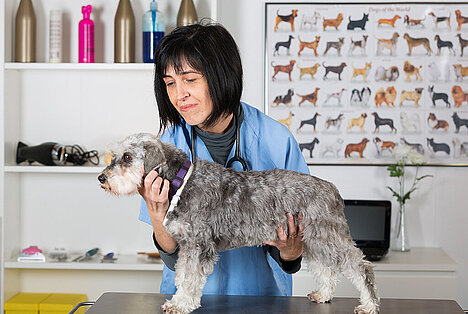Skin irritation

Skin irritations in dogs are one of the most common diseases in the canine world. They can have various causes and lead to itching, inflammation, hair loss and wounds. In this article, you will learn how to recognize the causes and treat skin irritations at home.
Causes of skin irritation in dogs
Skin irritation in dogs can have various causes. A particularly common cause is an allergic reaction triggered by certain foods or environmental stimuli. Parasite infestations, such as fleas or mites, can also lead to skin problems. Another reason can be an infection caused by fungi, bacteria or yeasts, which cause inflammation, itching and hair loss. Finally, psychological factors such as stress, anxiety or boredom can also lead to skin irritation if the dog licks or scratches itself.
Symptoms of skin irritation in dogs
The symptoms of skin irritation in dogs can vary depending on the cause. The most common signs are:
- Frequent scratching, biting or licking of the skin
- Redness, swelling or warmth of the affected areas
- Scaling, scabs or crusts
- Hair loss or bald patches
- Unpleasant odor or pus formation
- Behavioral changes such as restlessness, nervousness or apathy
Treatment of skin irritation in dogs
The treatment of skin irritation in dogs depends on the diagnosis made by a vet. Depending on the cause, the vet may prescribe medication such as antihistamines, antibiotics, antifungals or antiparasitics. They may also recommend special shampoos, ointments or creams to soothe and heal the skin.
In addition to veterinary treatment, there are a few things you can do at home to soothe your dog's skin irritation:
- Bathe your dog with cold water and a mild shampoo without perfume or dyes. This can reduce itching and cleanse the skin.
- Avoid drying your dog with hot water or a hair dryer, as this can dry out and irritate the skin.
- Brush your dog's coat regularly to remove dead hair and dandruff and promote blood circulation to the skin.
- Trim your dog's claws short to prevent them from injuring themselves when scratching.
- Keep your dog's environment clean and free from allergens or irritants such as dust, pollen or chemicals.
- Feed your dog a high-quality diet without artificial additives or potential allergens such as grains, soy or dairy products.
- Offer your dog plenty of water to keep them hydrated and their skin healthy.
- Keep your dog busy with toys or walks to keep them mentally and physically active and relieve stress.
Prevention of skin irritation in dogs
The best prevention of skin irritation in dogs is to make sure your dog's skin and coat are in a healthy condition. This includes:
- Regular check-ups at the vet to detect and treat possible diseases at an early stage
- Regular parasite prophylaxis with suitable products against fleas, ticks and mites
- Regular vaccinations against infectious diseases that can affect the skin
- Regular grooming with brushing, bathing and clipping to keep the coat clean and shiny
- Balanced diet with high-quality food and supplements such as omega-3 fatty acids to protect and strengthen the skin
- Adequate hydration with fresh water always available
- Appropriate environment with comfortable temperature, humidity and lighting that does not dry out or irritate the skin
Skin irritation in dogs is a common problem that can have many causes. If you recognize the symptoms in time and take your dog to the vet, you can provide him with quick and effective treatment. You can also follow some tips to relieve and prevent skin irritation at home. In this way, you can give your dog a comfortable life and promote his health and well-being.
The authors assume that a veterinarian should be consulted if an animal is ill and that medication should only be taken after consultation with a doctor or pharmacist. Only an individual examination can lead to a diagnosis and treatment decision.
We help you find the nearest vet → This way